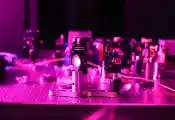Over £100 Million Boost to Quantum Hubs to Develop Life-Saving Blood Tests and Resilient Security Systems
July 26, 2024 -- Faster medical scanners, secure communication networks, and next-generation navigation systems are set to be realised through quantum technology, thanks to £100 million in government funding for five new research hubs.
Announced by the Science Secretary Peter Kyle today (Friday 26 July), the hubs will bring researchers and businesses together to use their scientific expertise and talent alongside the commercial know-how and resources to develop groundbreaking quantum technologies that will directly impact people’s lives in areas like healthcare, security, and clean energy.
The new innovations in quantum will not only help deliver the government’s first mission to kickstart economic growth by creating new technologies in hubs that can be sold and exported to drive up GDP, but by innovating in the science and technology industry, it will support the delivery of the government’s missions to rebuild Britain, with quantum technology helping to build a more efficient NHS that is fit for the future and future-proofing cyber security to keep our streets safe.
These new hubs will be centres for advancements in areas like quantum-enhanced blood tests, faster MRI scanners, and new surgical interventions and treatments. This could mean faster detection of diseases like cancer, allowing for earlier medical interventions and potentially saving lives. Ultimately, these breakthroughs could translate to better patient outcomes and easing pressure on our hardworking NHS.
They will also explore technologies crucial for national security. This could see aircraft operating with improved positioning systems that are resistant to GPS jamming, or submarines able to operate for extended periods without relying on satellites. Additionally, research into a ‘quantum internet’ could create secure and future-proof communication networks, safeguarding sensitive data and communications infrastructure – helping protect citizens and the economy.
Secretary of State for Science, Innovation and Technology, Peter Kyle, said: “We want to see a future where cutting-edge science improves everyday lives. That is the vision behind our investment in these new quantum technology hubs, by supporting the deployment of technology that will mean faster diagnoses for diseases, critical infrastructure safe from hostile threats and cleaner energy for us all.”
These five new hubs will be led by leading universities across the UK and will work closely with industry partners. This collaboration ensures that research translates into real-world applications that benefit the public. The Quantum Technology Hubs are:
The UK Quantum Biomedical Sensing Research Hub (University College London and University of Cambridge): Explores quantum sensors for ultra-sensitive disease diagnosis, including rapid blood tests, and biomedical scanners to facilitate earlier diagnosis and treatment of diseases such as cancer and Alzheimer’s disease.
UK Quantum Technology Hub in Sensing, Imaging and Timing (University of Birmingham): Focuses on the development of quantum sensing for practical applications - brain scanners for dementia, cancer diagnostics, and advanced security and infrastructure monitoring.
Integrated Quantum Networks Quantum Technology Hub (Heriot-Watt University): Aims to deliver the technologies for a future UK-wide ‘quantum internet’, enabling future-proof cybersecurity and powerful distributed quantum computing.
Hub for Quantum Computing via Integrated and Interconnected Implementations (University of Oxford): Develops technologies for building quantum computers, advancing UK capabilities across hardware and software and targeting applications in a wide range of industry sectors.
The UK Hub for Quantum Enabled Position, Navigation and Timing (University of Glasgow): Creates quantum-based positioning and navigation systems for critical infrastructure, autonomous vehicles, and improved indoor and underwater navigation.
The hubs will be delivered by the UKRI Engineering and Physical Sciences Research Council (EPSRC), with a £106 million investment from EPSRC, the UKRI Biotechnology and Biological Research Council, UKRI Medical Research Council, and the National Institute for Health and Care Research.




































